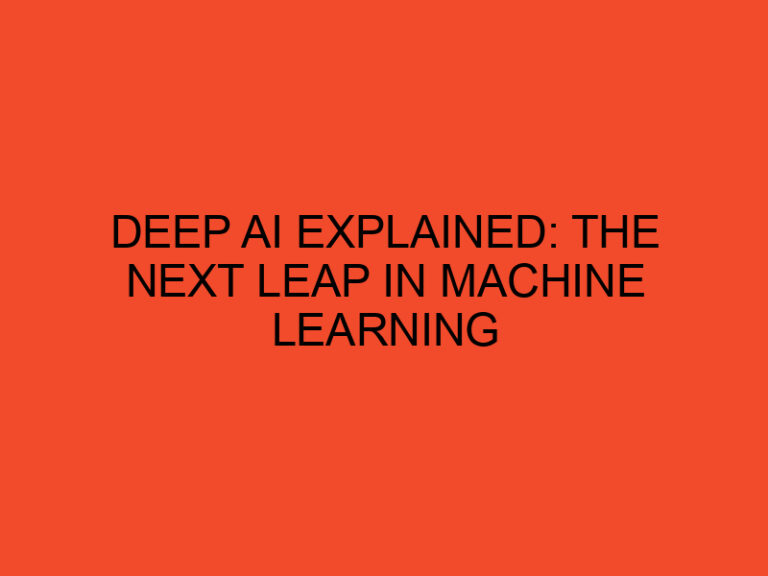As machine intelligence (MI), often referred to as artificial intelligence (AI), continues to advance, more professionals are looking to upskill and learn how to work with cutting-edge technologies in this field. In 2024, many institutions and platforms offer top-quality courses that cover everything from machine learning and deep learning to natural language processing (NLP) and neural networks.
Here’s a list of some of the best machine intelligence courses in 2024 for beginners and professionals alike:
Table of Contents
- 1. Stanford University – Machine Learning (Coursera)
- 2. MIT – Introduction to Deep Learning
- 3. Udacity – Artificial Intelligence Nanodegree
- 4. DeepLearning.AI – Machine Learning Specialization
- 5. Harvard University – CS50’s Introduction to Artificial Intelligence with Python
- 6. Google Cloud – Machine Learning Engineer Professional Certificate
- 7. IBM – AI Engineering Professional Certificate (Coursera)
- 8. DataCamp – Machine Learning Scientist Career Track
- 9. California Institute of Technology – Learning From Data (edX)
- 10. Kaggle Learn – Intermediate Machine Learning
- Conclusion
1. Stanford University – Machine Learning (Coursera)
One of the most popular and well-regarded machine learning courses, this offering by Andrew Ng on Coursera provides a thorough introduction to machine learning, deep learning, and neural networks. It’s suitable for beginners and covers everything from linear regression to advanced AI algorithms.
Key topics:
- Supervised and unsupervised learning
- Support vector machines
- Neural networks
- Best practices in machine learning
Why it’s great: This course balances theory with practical implementation, helping learners build foundational skills. It’s widely considered one of the best introductory courses in the field.
2. MIT – Introduction to Deep Learning
MIT’s course on deep learning, available on edX, is perfect for those looking to specialize in deep learning, which is a key area within machine intelligence. It explores the fundamental architectures of deep learning and their applications in real-world scenarios like autonomous driving, healthcare, and natural language processing.
Key topics:
- Convolutional neural networks (CNNs)
- Recurrent neural networks (RNNs)
- Reinforcement learning
- Natural language processing (NLP)
Why it’s great: MIT’s course offers deep insights into advanced machine intelligence topics and emphasizes practical applications. This makes it suitable for learners who already have some background in machine learning.
3. Udacity – Artificial Intelligence Nanodegree
Udacity’s Artificial Intelligence Nanodegree is an in-depth program that helps students build a strong understanding of AI concepts and develop practical AI applications. The course is split into several modules, each focused on areas like search algorithms, robotics, and reinforcement learning.
Key topics:
- Search and optimization algorithms
- Adversarial search
- Robotics
- Computer vision and deep learning
Why it’s great: The Nanodegree includes real-world projects, so students can apply what they learn and build a portfolio that showcases their skills. Plus, Udacity offers career services like resume reviews and interview prep for learners.
4. DeepLearning.AI – Machine Learning Specialization
DeepLearning.AI, in collaboration with Coursera, offers a Machine Learning Specialization. This course builds on foundational machine learning topics and focuses on deep learning and the practical implementation of machine learning models. It’s one of the best options for professionals looking to master AI techniques.
Key topics:
- Supervised learning algorithms
- Neural networks and backpropagation
- Structured machine learning projects
- Convolutional and sequence models
Why it’s great: Created by AI expert Andrew Ng, this specialization offers a series of comprehensive modules that cover both theory and applied machine learning. It’s ideal for those looking to master deep learning algorithms.
5. Harvard University – CS50’s Introduction to Artificial Intelligence with Python
This free Harvard University course, available on edX, is a great starting point for individuals interested in machine intelligence. It focuses on AI concepts and provides hands-on experience using Python, one of the most popular programming languages in AI.
Key topics:
- Search algorithms
- Knowledge representation
- Machine learning algorithms
- Reinforcement learning
Why it’s great: This course includes practical projects where learners build AI-based solutions, such as solving games and performing natural language processing tasks. It’s perfect for beginners with some coding experience.
6. Google Cloud – Machine Learning Engineer Professional Certificate
For professionals looking to get hands-on experience with machine learning on cloud platforms, Google Cloud’s Machine Learning Engineer Professional Certificate is a great choice. This course covers machine learning in TensorFlow and teaches how to deploy ML models in production environments.
Key topics:
- TensorFlow for machine learning
- Building ML models with cloud services
- Data engineering for ML
- Deploying scalable ML solutions
Why it’s great: Google Cloud’s course emphasizes scalability, making it ideal for professionals who want to learn how to build and deploy machine learning models in real-world production settings.
7. IBM – AI Engineering Professional Certificate (Coursera)
IBM offers an AI Engineering Professional Certificate on Coursera. This course teaches a broad range of topics in AI and machine learning, with a focus on deep learning and reinforcement learning. It’s perfect for learners who want to explore various AI techniques and frameworks like PyTorch and Keras.
Key topics:
- Deep learning
- Neural networks with Keras and TensorFlow
- Reinforcement learning
- Building AI applications
Why it’s great: With IBM’s backing, the course offers practical insights into AI engineering, and students can earn a professional certificate recognized by employers.
8. DataCamp – Machine Learning Scientist Career Track
DataCamp’s Machine Learning Scientist Career Track is a well-rounded course for individuals looking to become machine learning experts. The course covers a wide array of machine intelligence topics, including regression, classification, deep learning, and time-series analysis.
Key topics:
- Supervised and unsupervised learning
- Deep learning with TensorFlow
- Time-series data and forecasting
- Model evaluation and improvement
Why it’s great: DataCamp offers an interactive learning platform where users can write and run code within the course, making it highly engaging and hands-on.
9. California Institute of Technology – Learning From Data (edX)
Offered by Caltech, this course is an excellent academic exploration of machine learning and machine intelligence. It dives deep into the theory behind machine learning algorithms and models and offers practical exercises that help students apply these concepts to real-world problems.
Key topics:
- The theory of generalization
- Linear models
- Nonlinear transformation and neural networks
- Model selection and validation
Why it’s great: This course is ideal for individuals with a strong interest in the mathematical foundations of machine learning. It provides an academic-level understanding of how machine learning models work and is perfect for those aiming for research or high-level development roles.
10. Kaggle Learn – Intermediate Machine Learning
For those with a foundation in machine learning and looking to advance their skills, Kaggle Learn’s Intermediate Machine Learning is a great course. It’s project-based, focusing on practical implementations of algorithms to solve complex problems using real-world data.
Key topics:
- Handling missing data
- Feature engineering
- Cross-validation
- XGBoost and advanced tree models
Why it’s great: Kaggle’s interactive platform allows learners to experiment directly with code and tackle machine learning problems on their own datasets, making it a practical and flexible course for professionals.
Conclusion
In 2024, the demand for machine intelligence skills is soaring, and the courses listed above provide a range of learning paths—from beginner to expert levels. Whether you’re looking to gain foundational knowledge in machine learning or dive deep into advanced topics like deep learning and AI engineering, these courses offer the tools and insights you need to excel in the field.
With the rise of AI-powered technologies, taking one or more of these top courses will ensure that you’re well-equipped to navigate the future of machine intelligence.






